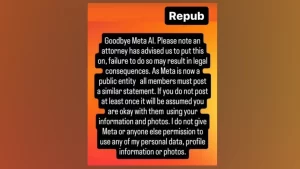Celebrities Caught in the “Goodbye Meta AI” Hoax
3 min read

Over 600,000 people, including notable celebrities like James McAvoy, Ashley Tisdale, and Tom Brady, have fallen victim to a viral hoax that falsely claims to prevent Meta, the parent company of Facebook and Instagram, from using their images to train artificial intelligence (AI). This misleading “Goodbye Meta AI” message has circulated widely on social media, prompting many users to believe that sharing the post would protect their privacy.
The hoax asserts that by reposting the message, individuals can deny Meta the right to use their personal information. However, this is fundamentally untrue. Users who wish to opt out of having their data used for AI training must do so directly in their account settings, and simply sharing a post does not alter any privacy settings.
Meta’s third-party fact-checking partner, Lead Stories, has already classified many of these posts as “false information.” The misleading narrative appears to be a backlash against Meta’s announcement in June regarding its intention to utilize public posts for AI model training. However, Meta has clarified that sharing the message does not affect any user’s privacy status. A spokesperson from the company emphasized, “Sharing this story does not count as a valid form of objection.”
The origins of the hoax can be traced back to a post made on Facebook on September 1, which contained slightly different wording than the version that ultimately gained traction. It wasn’t until this past week, when numerous high-profile accounts began sharing the post, that the trend skyrocketed. Google Trends recorded a significant spike in searches for “Goodbye Meta AI” following September 24, illustrating the growing interest and confusion surrounding the issue.
This incident is part of a broader pattern seen on social media platforms, where users frequently engage in “copypasta” — a term referring to blocks of text that are widely copied and pasted across various platforms. Fact-checking site Snopes has documented several similar occurrences over the past decade, where users have claimed to assert their privacy rights through public declarations, all to no effect.

What makes this incident particularly noteworthy is the number of high-profile individuals who fell for the hoax. Celebrities are often seen as trendsetters, and their participation can amplify the spread of misinformation. While many users may not have been aware of the facts, the involvement of these well-known figures lent an air of credibility to the message, further fueling its viral nature.
The backlash against AI training using public posts is not confined to Meta. Other social media platforms have also faced criticism for their data usage policies. LinkedIn, for instance, recently reversed its decision to utilize public posts for AI training in the UK after facing backlash from users concerned about their privacy.
This incident serves as a cautionary tale about the importance of verifying information before sharing it online. As social media continues to evolve, the potential for misinformation remains high, especially when celebrity influence is involved. Users are urged to take a moment to research claims, particularly those that seem to offer simple solutions to complex privacy concerns.
In conclusion, while the “Goodbye Meta AI” hoax may have captured the attention of many, it highlights a critical issue surrounding privacy in the digital age. Users should be proactive in managing their privacy settings and informed about how their data is utilized by social media companies. As the conversation about AI and data privacy evolves, it is crucial for individuals to remain vigilant and discerning in their online activities.